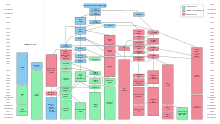Unix
family of computer operating systems that derive from the original AT&T Unix from 1969
Unix is a multitasking, multiuser computer operating system that exists in many variants. The original Unix was developed at AT&T's Bell Labs research center by Ken Thompson, Dennis Ritchie, and others.

Quotes
edit- Unix was built for me. I didn't build it as an operating system for other people, I built it to do games, and to do my stuff.
- Ken Thompson (February 18, 2019). The Thompson and Ritchie Story. National Inventors Hall of Fame - NIHF.
- This is the Unix philosophy: Write programs that do one thing and do it well. Write programs to work together. Write programs to handle text streams, because that is a universal interface.
- Unix is user-friendly — it's just choosy about who its friends are.
- Anonymous, in The Art of UNIX Programming (2003) by Eric S. Raymond
- UNIX is simple and coherent, but it takes a genius (or at any rate, a programmer) to understand and appreciate its simplicity.
- Dennis Ritchie (1989) "Unix: A Dialectic"
- I define UNIX as 30 definitions of regular expressions living under one roof.
- Donald Knuth. Digital Typography, ch. 33, p. 649 (1999)
- Unix was not designed to stop you from doing stupid things, because that would also stop you from doing clever things.
- Doug Gwyn, in Introducing Regular Expressions (2012) by Michael Fitzgerald, also (2006) in Best UNIX Quotations
- The Unix room still exists, and it may be the greatest cultural reason for the success of Unix as a technology. More groups could profit from its lesson, but it's really hard to add a Unix-room-like space to an existing organization. You need the culture to encourage people not to hide in their offices, you need a way of using systems that makes a public machine a viable place to work - typically by storing the data somewhere other than the "desktop" - and you need people like Ken and Dennis (and Brian Kernighan and Doug McIlroy and Mike Lesk and Stu Feldman and Greg Chesson and ...) hanging out in the room, but if you can make it work, it's magical. When I first started at the Labs, I spent most of my time in the Unix room. The buzz was palpable; the education unparalleled.
- I think the Linux phenomenon is quite delightful, because it draws so strongly on the basis that Unix provided. Linux seems to be the among the healthiest of the direct Unix derivatives, though there are also the various BSD systems as well as the more official offerings from the workstation and mainframe manufacturers.
- Dennis Ritchie, in Interview With Dennis M. Ritchie. LinuxFocus.org (1999).
- Those who don't understand Unix are condemned to reinvent it, poorly.
- Henry Spencer, in Introducing Regular Expressions (2012) by Michael Fitzgerald
- Anything new will have to come along with the type of revolution that came along with Unix. Nothing was going to topple IBM until something came along that made them irrelevant. I'm sure they have the mainframe market locked up, but that's just irrelevant. And the same thing with Microsoft: Until something comes along that makes them irrelevant, the entry fee is too difficult and they won't be displaced.
- Kenneth Thompson "Unix and Beyond: An Interview with Ken Thompson", Computer 32 (5), May 1999, pp. 58-64[1]
- Will journalling become prevalent in the Unix world at large? Probably not. After all, it's nonstandard.
- The UNIX Hater's Handbook, 1994, ISBN 1568842031, chapter 13, page 267